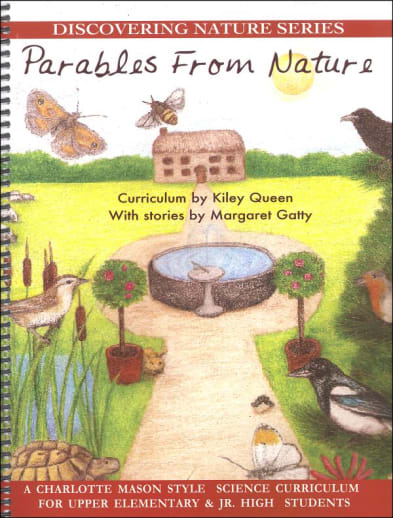A wide variety of science topics, from bees, birds, sea creatures, phases of the moon, the water cycle and much more are discussed through a series of nature parables authored by Mrs. Margaret Gatty.
Parables From Nature (Discovering Nature Series)
Description
And now for something completely different! This Charlotte Mason style science program from Queen Homeschool Supply offers students a unique approach to science through nature study, research and engaging stories. Each volume follows a specific nature theme and features content and activities suitable for a range of grade levels. There are 36 lessons in each volume, all structured so that they can be easily divided into five days of work for 180 total days of science.
Every lesson begins with a fictional but educational read-aloud that serves as an introduction to the topic, and includes some tidbits to spark the reader's interest. Follow-up activities are related to the animal or plant mentioned or discussed in the read-aloud, but often the student will need to do further research to answer the questions or complete the activity. The style, content and length of the read-alouds vary from book to book, with A Nature Walk with Aunt Bessie, Mary's Meadow, and Parables from Nature all containing stories written in the late 1800's while All Nature Sings, Our Animal Friends, Summer by the Sea and Further Investigation are based around contemporary stories.
There are several activities following each read-aloud and these are extremely varied as well, so students aren't likely to get bored as they move from chapter to chapter! For example, in A Nature Walk with Aunt Bessie (for Gr. 2-6), one read-aloud introduces moles as Harry catches a mole and shows it to Aunt Bessie. The following activities include a mole coloring sheet, a page of fun facts about moles, a hands-on activity where students dig their own mole tunnels and molehills in a sandbox or box of dirt, and digging for the answers (no pun intended!) to some mole research questions. Other lesson activities in the book include drawing the life cycle of the frog, writing a short report on mayflies, comparing the common rat and the water vole, examining pond water (with the naked eye and under a microscope, if possible), drawing different species of kingfishers, and much more.
In comparison, Summer by the Sea (for high schoolers) features higher-level activities and are much more research-heavy. In Lesson 8, Chloe and her aunt Judith discuss moonjellies and jellyfish. The following activities ask students to research the phylum Ctenophore, investigate the difference between bioluminescence and fluorescence, explore the phylum Arthropoda, and write a short report about other small creatures that live on New England beaches. Other activities at this level include sketching a plant, animal or structure, classifying a given species, finding and listing the scientific names for given species, making a chart of the carbon cycle and much more. As they complete the activities, they are compiling a good deal of information on each topic into their book. In essence, they are writing their own science book and it will definitely be something they can look back at and be proud of.
Compared to other science curriculums, students will spend much more time researching, drawing and writing, and as they do this, they'll spend much more time with animal and plant species than they would with a traditional science program. You'll want to note, however, that there is no teacher component; no answer key. As the teacher, you're responsible for making sure they get the most out of each lesson, and you may spend a considerable amount of time helping younger students locate the resources they'll need. At the high school level, the content varies considerably from other courses. There is no lab component, and although students will learn a great deal about some topics, such as sea creatures in Summer by the Sea, they won't be spending a much time (if any) on other biology topics like genetics and DNA, cellular biology, dissection and anatomy, etc. This may be something to consider if your student is pursuing further education in the sciences or is facing standardized testing in science.
If you're looking for a very Charlotte Mason-like program and have students that live and breathe animals and nature, this would be a program to consider. Please note that volumes are consumable and not reproducible; each student should have their own book. - Jess
| Product Format: | Softcover Book |
|---|---|
| Grades: | 5-8 |
| Brand: | Queen Homeschool Supplies |
| Length in Inches: | 11 |
| Width in Inches: | 9.75 |
| Height in Inches: | 1.25 |
| Weight in Pounds: | 1.95 |

